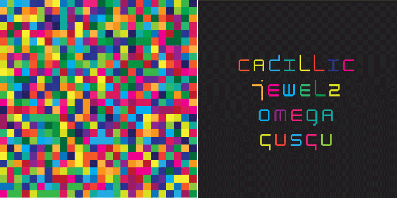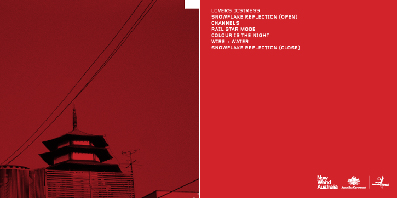 |
Thomas Williams vs Scissor Lock
Jewelz
New Weird Australia Editions, 2012 NWAED09
http://newweirdaustralia.com/skill/albums-eps/
In addition to the free ongoing compilation series feeding those of us who are hungry for what’s new and curious in Australian music (see review of Vols 1 & 2), the New Weird Australia project also releases a series of limited run CD editions (with free downloads) highlighting the work of particular artists.
One of latest in the series comes from two fellows who, despite their youthful appearance, have already created a significant impact through both their live performances and releases in various other guises. Tom Smith has been masquerading as Cleptocleptics for the last few years, recently changing his ‘stage name’ to Thomas Williams, while Marcus Whale plays prolifically as Scissor Lock and is one half of the pop duo Collarbones (with Travis Cook). They first teamed up for a New Weird Australia benefit gig and have continued to collaborate, with Jewelz being their first EP.
Thomas Williams' work is heavily sample based, while Scissor Lock is known for his gritty swathes of feedback and lo-fi vocals (see Silent Hour review RT103), and while you can hear each artist’s particular signature in the compositions, Jewelz is particularly impressive for the way in which their styles seem to meld into a texturally complex, atmospherically rich yet still essentially melodic sound.
“Cadillic” eases us in with a slightly awkward, lilting melody of mashed sounds. It’s clearly a sample, but of what remains vague; instead it offers a patina of nostalgia—not for the original piece of music itself, but for the early sound of sampling. The rhythm is joined by half-hidden vocals—a cool pop whine—yet the sibilances are distorted, the words buried in grit.
The title track “Jewelz” is the standout. It’s an eight minute adventure starting with what seems to be a melodic fragment referencing Laurie Anderson’s “Born, Never Asked,” but played on tortured instruments, snipped and tucked into uneven phrases until it transforms into a repetitive, degraded nasal stab (a reference to “Oh Superman”?). This is enveloped in escalating sheets of noisy feedback and grit giving way to a childlike chanting of muffled vocals, delayed and cannoning between the left and right field until they fade into flutter distortion.
“Omega” displays a similar fluidity in structure as a loose, breezy sample loop is increasingly stretched and twisted, melding into orchestral crescendos, shifting to hints of beats and eventually disintegrating. “Qusqu” is a structurally simpler affair: a gradual escalation from the hiss of punched-up gain through to heightened fuzz and a growing harmonic bed underpinning wistful vocals, with, once again, that inevitable disintegration.
Jewelz is aptly named—a little treasure. But not in the shiny conspicuous way of precisely cut and polished gems, rather the intrigue comes more from the strange geological forces at work—the melting and compression—that has gone into forging each of these raw sound compounds. Each sonic fragment making up the music is a curiosity, the samples alluding to something—a song, an instrument, a texture—almost recognisable but ultimately remaining elusive. These are then crafted into a set of songs that have enough angularity to offer a challenge, but essentially are still a pleasurable listen.
 |
Spartak
Nippon
New Weird Australia Editions, 2011, NWAED08
http://newweirdaustralia.com/skill/albums-eps/
Canberra duo Spartak have been making a name for themselves outside their hometown through a rigorous touring schedule from which this album is a result, containing a series of tracks recorded live during a recent trip to Japan.
Spartak is Shoeb Ahmad on guitar, electronics, clarinet and vocals, and Evan Dorrian on drums, percussion, field recordings and voice. The duo has a distinct improv feel, particularly evident in the impressive playing of Dorrian, so the live recording format feels like a fitting way to capture their sound.
The album starts with a fragment—“Lover’s Distress” seems like the middle two minutes of an improvisation, introducing us to the sonic territory of swirling guitar figures and artfully scattered percussion, with an occasional feedback swell.
“Snowflake Reflection (opening)” also seems to start someway into the session, after the musicians have established some material. Small guitar arpeggios swell out into occasional larger melodic fragments, the easy-listening guitar sound surrounded by tremors of agitation from Dorrian’s cymbal spatter and drum rumbles with floating electronic textures and samples. The excerpt takes us up one gear from ambient and then cuts dead, into the next track.
On most of the tracks on Nippon, the electronic and augmented sounds seem to sit outside the instruments, a shell-like coating rather than meshing and melding with them. However on “Channels” the swelling, sheering sound is hard to decode—possibly field recording, possibly percussive friction, possibly guitar pedal emanation, perhaps all of these. A distant melody and a small rhythm, slowly building, give the sense of the insistent yet somehow controlled pace and buzz of Japan’s larger cities.
“Colour is the Night” is the centrepiece of the album. At nine minutes it allows the musicians to travel through a range of territories curtailed in the shorter excerpts. Starting with a small ambient loop of guitar string scratches it evolves into a kind of busier version of a John Fahey guitar line with surrounding waves of shushing cymbals and drum patter—a specialty of Dorrian who can make the individual elements of percussion combine into a shimmering sustain. This track too ends abruptly, merging into “Wire + Water," replacing the meditative space we’ve just reached with an agitated drum solo, augmented perhaps by reversed drum samples and delicately peppered with electronic bleeps.
The album finishes with another version of track 2, “Snowflake Reflections (Closer),” but this recording seems to be a more lo-fi affair, taken from the room rather than individual instrument feeds. It reinforces the point of the album—that it’s a live document— and while the sound feels very different, it’s worthwhile as it seems a particularly good version of the piece with Evan Dorrian hitting his stride in a rocking drum finale.
Ironically, the through-line of Spartak’s Nippon is interruption. Shoeb Ahmad frequently uses filters that break up his guitar melodies depositing them in more challenging configurations. This effect is also particularly evident on the vocally driven “Rail Start Mode” which includes samples of gospel preaching and insistent vocal moaning—somewhat out of place in terms of content and contrivance. The abrupt beginnings and ends of tracks also reinforce the sense of liveness—we are offered moments, not the whole event. It keeps the album moving, but it makes you wonder if the tracks have a sense of structure beyond gradual expansion since we never get to hear an ending. That aside, Spartak’s Nippon, is a well-paced exploration of live performance as document from an engaging duo.
Gail Priest
© Gail Priest; for permission to reproduce apply to [email protected]








 back
back